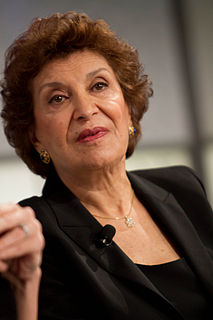A Quote by E. O. Wilson
The great challenge of the twenty-first century is to raise people everywhere to a decent standard of living while preserving as much of the rest of life as possible.
Related Quotes
Leadership is the great challenge of the 21st century in science, politics, education, and industry. But the greatest challenge in leadership is parenting. We need to do more than just get our enterprises ready for the challenges of the twenty-first century. We also need to get our children ready for the challenges of the 21st century.
Actually what is happening in the twenty-first century, this is the great century of migration, so we have people from all around the globe going all over the place, and they have to integrate into a society, that society that exists has to integrate with them. Both sides have to work at it. It's not a one-way thing.
Because of the terrorist threat, the FBI and CIA have become as important as the military in preserving our freedom. Yet while thanking our military is standard practice in American life, no one thinks of thanking the FBI, the CIA, or the rest of the intelligence community for keeping us safe since 9/11.
I've spent most of my life living in cities where people are obsessed with looking down on people from everywhere else. You get so used to doing it that you start to believe it's simply what everyone does. It makes for an atmosphere of unwelcome that penetrates much of our modern life. It's a shame really because a couple days in Oklahoma will open your eyes to how much better it would be if the rest of the country was filled with a few more people from Oklahoma.
As to the "traditional filler of twenty-first century realist fiction," maybe that is something I avoid. I don't relate to standard psychologizing in novels. I don't really believe that the backstory is the story you need. And I don't believe it's more like life to get it - the buildup of "character" through psychological and family history, the whole idea of "knowing what the character wants." People in real life so often do not know what they want. People trick themselves, lie to themselves, fool themselves. It's called survival, and self-mythology.
The Reformed tradition at the beginning of the twenty-first century is different as a consequence of this - and different in nontrivial ways. Some may scoff at this, saying that such "developments" don't represent Reformed thought. But by what standard? Perhaps by the Westminster Confession. But this is only one Reformed confession, and it was only ever a subordinate standard.



































